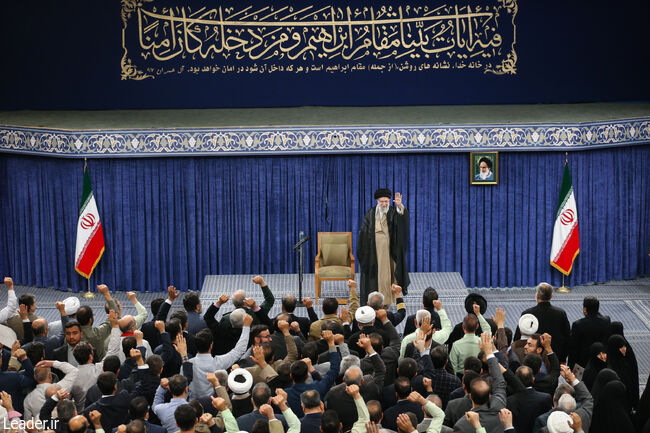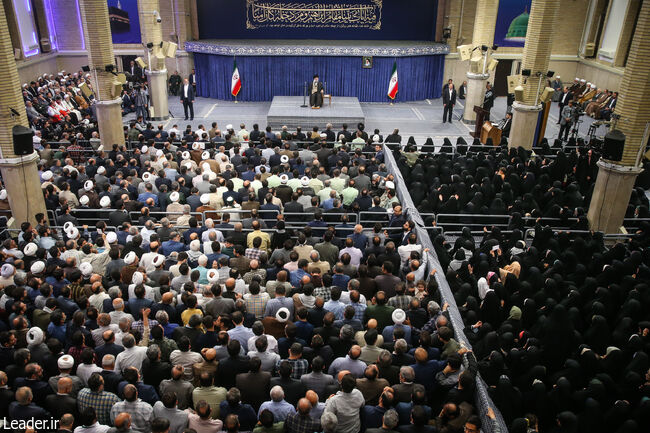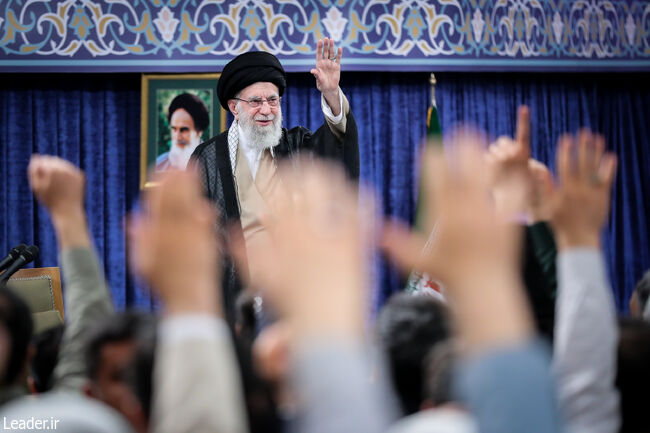In a meeting this morning with officials responsible for organising the Hajj and a group of pilgrims to the Sacred House of God, the Leader of the Islamic Revolution said that God's purpose in instituting the Hajj was to present a comprehensive and guiding model for the governance of humanity. He said, "The external form and appearance of this obligation is entirely political, while its internal components are wholly spiritual and devotional, so that it would address the interests of all humankind. Today, the greatest benefit for the Islamic Ummah is unity and synergy in addressing the problems of the Islamic world; had such unity existed, crises such as those in Gaza and Yemen would not have occurred."
At the beginning of his remarks, Ayatollah Khamenei once again extended his condolences to the families of the victims of the very tragic Bandar Abbas incident. He prayed for patience and peace for his fellow countrymen who were victims and their families who were affected. He said, "The Almighty grants a reward thousands of times more valuable to those who endure hardships with patience in the face of adversity."
He said that damage to infrastructure during natural or unnatural disasters can be remedied with the help and capability of other institutions, adding, "What truly breaks the heart are the beloved families who have been lost, which has turned this incident into a tragedy for all of us."
Continuing his remarks, the Leader of the Revolution emphasised that proper understanding and recognition of the objectives and various dimensions of Hajj are necessary prerequisites for the correct performance of this crucial obligation by the pilgrims to the Holy House of God. Citing numerous verses from the Holy Quran, he added, "The use of the term 'al-nas' (people) in many Hajj-related verses indicates that the Almighty has ordained this obligation for the governance of all people, not just Muslims. Therefore, the proper observance of Hajj is a service to all humanity."
In elucidating the cognitive aspects of the Hajj, he described it as the only religious obligation whose form and structure are entirely political. It annually gathers people in a single place and time for specific purposes.
Ayatollah Khamenei further stated, "While the form and structure of the Hajj are entirely political, the essence of its components is completely spiritual and devotional—each element carrying symbolic meaning and instructive lessons about various essential aspects of human life."
In elucidating these symbols, he described the lesson of Tawāf (circumambulation) as the necessity of revolving around the axis and centrality of Tawhīd (Divine Unity). He added, "Tawāf teaches humanity that governance, life, economy, family, and all the affairs of life must be founded upon Tawhid. In such a case, there would no longer be cruelty, child-killings, or greed, and the world would become a garden of peace."
The Leader of the Revolution regarded the saʿy (the hurrying) between Ṣafā and Marwah as a symbolic reminder of the necessity for constant human effort between the mountains of difficulties, and to never remain idle, hesitant, or bewildered.
Ayatollah Khamenei described the movement toward ʿArafāt, Muzdalifah (al-Mashʿar), and Minā as a lesson in perpetual motion and avoidance of stagnation. He added, "The act of sacrifice (Qurbani) likewise is a symbolic gesture, pointing to the truth that one must sometimes part with what is dearest, offering up what one loves or even offering oneself."
He further described the Ramy al-Jamarāt (stoning of the pillars) as a divine emphasis on the importance of recognising satanic forces among us, both demonic and human, and striking and crushing them wherever they are encountered.
The Leader of the Revolution denoted the donning of the garment of iḥrām as symbolising both the humility and the equality of humanity before their Lord, adding, "All these rites direct the course of human life."
Citing a verse from the Noble Qur'an, the Leader said that the purpose of the Ḥajj gathering is to understand and attain the various human benefits it has to offer. He continued by stating, "Today, there is no greater benefit for the Islamic Ummah than unity. Had there been unity, coordination and synergy among Muslims, the current atrocities in Gaza and Palestine would not be happening, and Yemen would not be under such pressure."
He emphasised that the disunity and division within the Islamic Ummah enable colonial powers, the U.S., the Zionist regime, and other expansionists to impose their interests and ambitions upon other countries. He added, "Through the unity of the Ummah, security, progress, synergy among Islamic nations, and their cooperation with one another would become possible. This is the lens through which the opportunity of Hajj must be viewed."
Ayatollah Khamenei emphasised the crucial responsibility of Islamic governments, especially of the host nation, to elucidate the true essence and purpose of Hajj. He added, "Leaders of Muslim nations, religious scholars, thinkers, writers, and social media influencers must convey the realities of Hajj to the people."
Before the Leader's address, Ḥujjat al-Islām Sayyid ʿAbd al-Fattāḥ Navvāb, the Representative of the Leader in Hajj and Ziarat (Shrine Pilgrimage) Affairs and head of the Iranian Ḥujjāj, identified this year's Ḥajj slogan as: "Ḥajj: A Qur'anic Path, Islamic Unity, and Support for Oppressed Palestine." He also outlined the institution's plans for pilgrims during the current year.
The head of the Hajj and Ziarat Organisation, Mr. Bayat, stated in a report: "This year, 86,000 Iranians will have the honour of embarking on the pilgrimage to the Holy Land as part of 574 groups, departing from 23 airports."
Some key points highlighted by Hajj officials at the beginning of the meeting included:
- Over 210,000 'Umrah Mufradah performed in the past 8 months.
- Increased efficiency among administrative staff and Ḥajj service providers.
- Allocation of two caravans for Iranians living abroad for this year's Ḥajj.
- Full readiness of Ḥajj officials and service providers to offer the best possible services to Iranian pilgrims.



